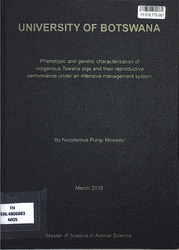Phenotypic and genetic characterization of indigenous Tswana pigs and their reproductive performance under an intensive management system
Abstract
The study was carried out to phenotypically characterize indigenous Tswana pigs under intensive management system and to genetically characterize Indigenous Tswana pig Population using a panel of 12 microsatellite markers. Phenotypic. characterisation of Tswana pigs was carried out on a total of 128 Fl progeny piglets and traits evaluated included body weight, heart girth circumference, pelvic and hock circumference, tail and ear length at birth and thereafter fortnightly until piglets were 3 months of age. There was no significant difference in body weights of piglets at birth between male and females and thereafter up to 3 months of age. There was also no significant difference in body length between males and females from day old up to 98 days of age. For height at withers, males had slightly larger heights than females from day old up to 98 days of age. The pelvic widths of males were greater than those of females from day old up to 42 days ofage and thereafter females had higher pelvic widths than their age-matched male counterparts up to 98 days of age. There were no significant sex differences in ear length, hock circumference and tail length from day old up to 98 days of age. In the second study, blood samples were collected from 30 Tswana pigs in the Southern half of the country (Kweneng, Kgatleng and South-East districts) and genomic DNA was extracted for genetic characterisation using a panel of 12 microsatellite markers. A total of 76 alleles were detected in 12 microsatellite markers screened and the allele size range varied from 83-107 bp at locus S0073 to 220-234 bp at marker locus Sw2406. The observed heterozygosity for individual markers ranged from 0.16 (Sw2405) to 0.875 (Sw2465) with average observed heterozygosity across all 12 loci of 0.647. The expected heterozygosity was lower than the observed heterozygosity and ranged from 0.143 (Sw2405) to 0.776 (S0385) with mean expected heterozygosity across all loci of 0.603. There is therefore moderate genetic variation in indigenous Tswana pigs found in the Southern half of Botswana.
Collections
- Theses and Dissertations [133]

